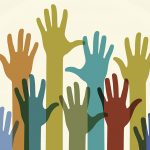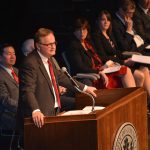Ask any group of high school teachers, and they will report that the most frequently asked question in their classrooms is, “When are we ever gonna use this?” In a traditional college prep program, the honest answer is usually, “Maybe when you get to the university.” But in the real world? Depending on the class, students may not find their learning as useful.
The following PBIS Practitioners Guide — titled National Climate Change: 5 Ways Schools Can Positively and Proactively Support All Students — originally appeared on the OSEP Center on Positive Behavioral Interventions and Supports website and is authored by Neag School faculty Brandi Simonsen, George Sugai, Jennifer Freeman, and Tamika La Salle.
Professor emerita Alexinia Young Baldwin ’71 Ph.D. of the Department of Curriculum and Instruction, died on Jan. 21, 2017. She was 91.
A new, interactive exhibit focused on implicit bias has arrived at the UConn Storrs campus. Created by the National Underground Railroad Freedom Center, the exhibit will be hosted at the Homer Babbidge Library through Feb. 28.
As members of the Equity and Social Justice Task Force, we believe that the new social and political context created by the presidential election requires not only that we reiterate these commitments, but also that we, the Equity and Social Justice Task Force, acknowledge and empathize with the many individuals and groups in our community who are experiencing a considerable amount of pain, fear, and concern for their safety.
Brittany (Perotti) Agne ’09 (CLAS), ’11 MA, a former Husky Sport volunteer who earned a master’s degree with a concentration in sport management at the Neag School, today serves as director of children’s education programs at New York Cares, a New York City-based nonprofit focused on volunteer management whose staff plans 1,600 volunteer-led projects every month.
Incidents of bullying and harassment taking place nationwide illustrate the dangerous effects of hate being modeled and reinforced on a national stage, according to a team of UConn school climate and behavior experts. Now spilling into classrooms and schools across the nation, these developments are presenting educators, parents, and communities with significant, immediate challenges as they seek to support students, while faced with their own feelings of stress, confusion, and lack of preparedness.
The Neag School of Education and its Alumni Board are proud to announce the 2017 Neag School Alumni Award honorees. Six outstanding Neag School graduates will be recognized at the School’s 19th annual Alumni Awards Celebration in Storrs, Conn., on Saturday, March 18, 2017.
Fake news and questions about its role in the outcome of the 2016 election have thrust concerns about internet literacy to the forefront. It’s an issue Neag School of Education professor Donald Leu has been studying for years; and the findings of a 10-year-old study he led demonstrating the inadequacies of classroom instruction in “new literacies” has been getting renewed attention.
Professor Del Siegle has been named Associate Dean for Research and Faculty Affairs for the Neag School. Siegle, a professor of gifted education in the Neag School’s Department of Educational Psychology, where he has served as department head since 2011, will officially join the Dean’s Office leadership team on Jan. 3, 2017.










